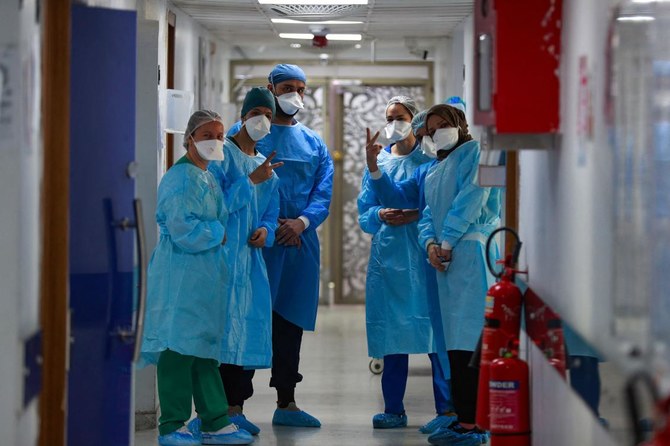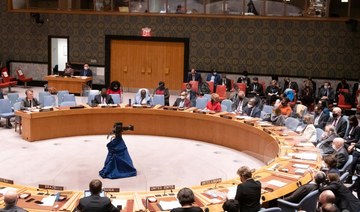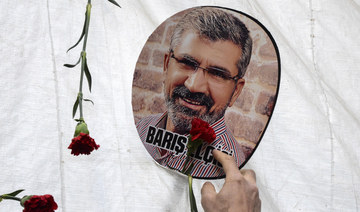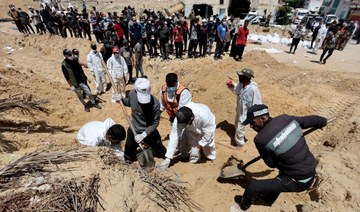BAGHDAD: In the stores and buses of Iraq masks are rare even as Covid-19 spreads widely, vaccines are viewed with suspicion and the sick see hospitals as a last resort.
At Al-Shifaa Hospital in the capital Baghdad, the ramifications are clear.
“More than 95 percent of those sick with Covid-19 in intensive care are unvaccinated,” said Ali Abdel Hussein Kazem, assistant director of the facility.
Half of the 40 intensive care beds are occupied in the department, where irregular beeping from monitors and IV machines is constantly heard.
Al-Shifaa hospital has been turned into a Covid treatment center since the start of the pandemic and can treat 175 patients.
Linked to breathing devices, an old man and a young woman share a large room, where a family member is allowed to monitor them — masked and in a white protective outfit.
Next door, a man in his 60s fidgets, pushing away his blanket. An asthmatic, he is also hooked up to a ventilator.
“He says he is suffocating,” an alarmed relative said, summoning a doctor.
Iraq’s public health system, already worn down by decades of war, under-investment and corruption, has struggled to cope with the coronavirus.
Since January, Iraq’s 40 million people have been confronted with a fourth coronavirus wave but — unlike other countries — the government has not imposed any restrictions.
Iraq has recorded more than 2.2 million infections and 24,000 deaths since the pandemic began two years ago, but data released by the authorities indicates that infections are now declining to around 2,000 new cases per day.
Despite 1,400 vaccination centers, officials struggle to overcome skepticism about the jabs, which health experts around the world say are saving lives.
Fewer than 10 million people in Iraq, about a quarter of the population, have been vaccinated, said health ministry spokesman Seif Al-Badr.
Among them, not even seven million have received two doses, and those with a booster number less than 100,000.
In neighboring Iran, 66 percent of the 83-million population have received two doses.
“About 90 percent of the sick are older than 60,” said Al-Shifaa’s intensive care director Mohammed Salih, as he made his morning rounds, checking X-rays and giving instructions.
“Most have chronic conditions: diabetes, high blood pressure, kidney disease,” Salih said, accompanied by doctors and nurses from Doctors Without Borders (MSF), a charity which is assisting the hospital.
Along with training that aims to “sustain the care,” the MSF program begun in November provides physiotherapy and mental health care, said Daniel Uche, a physician who heads the project.
Countering misinformation is another priority.
“Most of the pregnant women we admitted in our facility are not vaccinated because they are afraid for their precious babies, that maybe if they take the vaccine it will have an effect” on the infant, said Uche.
Salih said he noticed another trend: “Most of the patients come in only after reaching a critical stage.”
They prefer to stay at home because of “social media” and “rumors” which minimize the gravity of the coronavirus or which raise suspicions about the vaccines, he added.
Those are the latest challenges for a health system crippled by decades of war and especially an international embargo under the dictator Saddam Hussein, who was toppled in a US-led 2003 invasion.
“People are afraid of hospital because of rumors that say they won’t get proper care, and that we won’t be interested in looking after them,” a nurse said, requesting anonymity.
Two deadly fires at public hospital Covid-19 units last year sparked outrage among the population. One blaze killed more than 80 people in Baghdad in April and three months later another claimed at least 60 lives in Nasiriyah, southern Iraq.
Authorities acknowledge that challenges abound for a sector dealing with aging equipment and shortages.
Badr, the ministry spokesman, said the health infrastructure in some provinces “was entirely destroyed” in the war against the Daesh group jihadists from 2014-2017.
The health budget of the oil-rich country does not even receive two percent of state expenditures.
“For previous governments health care was not a priority,” said Badr, adding that even though the system is challenged it is ready to help those who are sick with Covid-19.
“We have thousands of beds available for people who would have breathing difficulties. We also have medicine and the necessary equipment, as well as vaccines,” he said.
At Al-Shifaa, Farouk Naoum, 75, is leaving hospital after his recovery. He was among the minority of Iraqis vaccinated with two doses of the Pfizer-BioNTech vaccine but despite the protection it offered, he still got infected.
“You have to be careful, very careful,” he said after his 31 days of treatment.
COVID-19 rages in Iraq as vaccinations lag
https://arab.news/yxbrb
COVID-19 rages in Iraq as vaccinations lag

- Al-Shifaa hospital has been turned into a Covid treatment centre since the start of the pandemic
- Iraq's public health system, already worn down by decades of war, under-investment and corruption, has struggled to cope with the coronavirus
Houthis blamed for attack on cargo ship in Red Sea

- Vessel hit by small boat, ‘airborne projectile,’ maritime agencies say
- Strike comes after US says it destroyed two anti-ship missile launchers in Houthi-controlled area
AL-MUKALLA: A commercial ship transiting the Red Sea was damaged on Wednesday in an attack by another vessel and a projectile thought to have been launched by the Houthi militia group, two UK maritime agencies said.
The UK Maritime Trade Operations said in an initial report that it received a message from the master of the cargo ship that it had sustained damage to its stern after being attacked by a small vessel about 66 nautical miles southwest of the port city of Hodeidah.
The smaller craft was “white in color and 5-7 meters in length. Authorities are investigating. Vessels are advised to transit with caution and report any suspicious activity,” it said.
In updates, the UKMTO said the ship was also struck by an “unknown airborne projectile,” was taking on water and not under the control of the crew.
A second maritime security service, Ambrey, identified the cargo ship as the Greek-owned Tutor and said it had suffered damage to its engine room.
While the Houthis did not immediately claim responsibility for the attack, Ambrey said the boat seemed to have been launched by the militia group from Yemen.
Over the past eight months, the Houthis have launched hundreds of ballistic missiles, drones and remote-controlled, explosive-laden boats at commercial and naval ships in international waters off Yemen and in the Indian Ocean, claiming their actions were intended to force Israel to end its war in Gaza.
But critics have said the group is taking advantage of the widespread condemnation of the killing of civilians in Gaza to shore up popular support while simultaneously recruiting and mobilizing fighters to attack the Yemeni government.
Wednesday’s attack came after the US Central Command said its forces had destroyed two anti-ship cruise missile launchers in a Houthi-controlled area of Yemen in the previous 24 hours.
US and UK forces conducted three airstrikes on Tuesday in Al-Salif district of Hodeidah province, according to Houthi media.
Meanwhile, the Houthis are coming under mounting pressure from around the world to free the scores of Yemeni employees of the UN and other foreign organizations who were abducted from their homes in Sanaa.
World Health Organization chief Tedros Adhanom Ghebreyesus said on Wednesday that a WHO employee was among those being held.
“We are working closely with our UN counterparts to ensure their safety. We urge an immediate and unconditional release. Humanitarian workers must never be a target,” he said.
Yemen’s Minister of Human Rights Ahmed Arman told Arab News this week that Dr. Abdul Nasser Al-Rabai, an immunization officer for the WHO’s Yemen office, was abducted in a raid on his home.
Meanwhile, the son of Judge Abdul Wahab Qatran said on Facebook on Wednesday that his father had been released after being held by the Houthis for five months.
Mohammed Abdul Wahab Qatran posted a photograph of himself with his father and siblings but said the Houthis were still holding his father’s phones and other items taken during a raid on his home.
“My free and heroic father was freed this afternoon but he is unable to access all of his accounts since his phones and accounts are still with the intelligence services,” he said.
Qatran Sr. was abducted in January and charged with denigrating a Houthi leader and publishing false news.
The judge was known for criticizing the Houthis for human rights violations and failing to pay public workers. Shortly before his abduction he voiced sympathy for a journalist who was attacked and beaten by the militia in Sanaa.
Court acquits Turkish police of killing human rights lawyer

- Tahir Elci, a prominent campaigner for Kurdish rights, was shot dead on a city street on November 28, 2015, during a gunfight between outlawed Kurdish militants and police
- The court ordered that three police officers be acquitted because of lack of evidence after a lengthy trial
DIYARBAKIR, Turkiye: A Turkish court on Wednesday acquitted three police officers nine years after the killing of a prominent rights lawyer in the Kurdish majority city of Diyarbakir.
Tahir Elci, a prominent campaigner for Kurdish rights, was shot dead on a city street on November 28, 2015, during a gunfight between outlawed Kurdish militants and police.
Elci, who was head of the Diyarbakir bar association, was cut down as he appealed for calm in the aftermath of the killing of two police officers by the PKK in a nearby street.
The court ordered that three police officers, who appeared before the court by video link, be acquitted because of lack of evidence after a lengthy trial. They stood accused of “causing death by foreseeable negligence” and faced up to six years in prison.
Amnesty International blasted the verdict as a “huge blow” to Elci’s family and the wider human rights community in Türkiye.
“The failure of the authorities to hold those responsible for his killing to account is a thorn in the heart of his loved ones and a stain on the justice system in Turkiye,” Amnesty’s deputy regional director for Europe Dinushika Dissanayake said in a statement.
Lawyers for Elci’s family had denounced multiple failures in the investigation as well as the destruction of evidence and successive changes of prosecutor in charge of the case.
The long-awaited trial opened in 2020, five years after the killing, after rights advocates including Human Rights Watch had criticized “extreme delays” in the case.
Elci’s death came after the collapse of a ceasefire between the Turkish state and the Kurdistan Workers’ Party (PKK), which is blacklisted as a terrorist group by Ankara and its Western allies.
In 2019, investigators from the London-based research agency Forensic Architecture published an in-depth report into the shooting, suggesting that security forces could have killed him.
Al-Azhar welcomes Security Council’s endorsement of Gaza truce call

- Grand imam of Al-Azhar, Sheikh Ahmed Al-Tayeb, hailed the resolution endorsed by the Security Council, which calls for a ceasefire in Gaza
- Al-Tayeb received a group of senior secondary students from the Gaza Al-Azhar Institute, Gaza Institute, Khan Yunis Institute, and North Gaza Institute
CAIRO: Al-Azhar Al-Sharif, Sunni Islam’s highest seat of learning, has welcomed the UN Security Council’s endorsement of the resolution to stop the aggression against the Gaza Strip.
The grand imam of Al-Azhar, Sheikh Ahmed Al-Tayeb, hailed the resolution endorsed by the Security Council, which calls for a ceasefire in Gaza, the full withdrawal of Israeli forces, the bilateral release of prisoners and hostages, the return of displaced Palestinians to their homes, the immediate entry of aid into the Gaza Strip, and moving toward the reconstruction of Gaza.
A statement from Al-Azhar said the seminary hopes that the Security Council will be able to ensure all the guarantees required for the implementation of the resolution and for all parties to adhere to it and save the lives of innocent people.
It stressed that the resolution, issued after the loss of more than 37,000 lives, “is a step in the right direction and represents a final opportunity to restore peace and trust in the international community and international institutions, promote global peace and security, and grant the Palestinian people their right to establish their independent state.”
Meanwhile, Al-Tayeb received a group of senior secondary students from the Gaza Al-Azhar Institute, Gaza Institute, Khan Yunis Institute, and North Gaza Institute. The male and female students joined Al-Azhar institutes in Cairo to pursue their studies after Israel launched its offensives against Gaza.
Al-Tayeb welcomed the Gazan students to Egypt and Al-Azhar, saying: “Our hearts have been broken over the past six months since the onset of the aggression, and we have felt for you during this human tragedy that has afflicted you day after day. However, our meeting with you today has induced hope in us anew. You have taught the world the meaning of steadfastness, perseverance, hope, and trust in God.
“I see this in your steadfastness and your determination to pursue your education. We at Al-Azhar Al-Sharif are happy to have you with us, and we will work to provide all the amenities that ensure your excellence. My door and the door of Al-Azhar are open to you at any hour of the day or night.”
He listened attentively to the students who recounted their ordeals during Israel’s invasion and expressed fears about the difficult days ahead.
The students offered Al-Azhar’s imam a Palestinian keffiyeh in appreciation for his role in supporting them and advocating for the Palestinian cause.
Hamas seeking US guarantees over Gaza ceasefire plan

- Mediators Qatar and Egypt said Hamas had responded on Tuesday without giving details
- US said Israel accepted the proposal, but Israel has not publicly stated this
GAZA: Hamas wants written guarantees from the United States for a permanent ceasefire and the withdrawal of Israeli forces from the Gaza Strip in order to sign off on a US-backed truce proposal, two Egyptian security sources said.
Mediators Qatar and Egypt said Hamas had responded on Tuesday to the phased ceasefire plan for an end to the eight-month war between Israel and the Palestinian militant group, without giving details.
The plan was made public at the end of May by US President Joe Biden. It includes the gradual release of Israeli hostages held in Gaza and pullback of Israeli forces over two phases, as well as the freeing of Palestinian prisoners, with the reconstruction of Gaza and return of the remains of deceased hostages in a third phase.
The United States has said Israel accepted the proposal, but Israel has not publicly stated this.
The Egyptian sources and a third source with knowledge of the talks said Hamas had concerns that the current proposal does not provide explicit guarantees over the transition from the first phase of the plan, which includes a six-week truce and the release of some hostages, to the second phase, which includes a permanent ceasefire and Israeli withdrawal.
The Egyptian sources said Hamas would only accept the plan if the guarantees were in place, and Egypt was in contact with the US about the demand.
“Hamas wants reassurances of an automatic transition from one phase to another as per the agreement laid out by President Biden,” the third source said.
Hamas and Egyptian authorities did not immediately respond to requests for comment.
When he announced the plan, Biden said that if negotiations to move to the second phase lasted longer than six weeks, the ceasefire would continue as those negotiations were extended.
Hamas said on Tuesday that its “positive” response to the proposal opened a “wide pathway” to reach an agreement.
But an Israeli official speaking on condition of anonymity said Hamas had “changed all of the main and most meaningful parameters,” characterising the group’s response as a rejection of Biden’s proposal for a hostage release.
One non-Israeli official briefed on the matter, who also declined to be identified, said that in its response, Hamas had proposed a new timeline for a permanent ceasefire with Israel and withdrawal of Israeli troops from Gaza, including Rafah.
More than 37,000 Palestinians have been killed in Israel’s offensive in the Gaza Strip, say health officials in the Hamas-ruled enclave.
The war began when Hamas militants attacked Israel on Oct. 7, killing 1,200 people and abducting some 250 others, according to Israeli tallies.
Negotiators from the US, Egypt and Qatar have been trying for months to mediate a ceasefire and free the hostages, more than 100 of whom are believed to remain captive in Gaza.
Gaza families desperate for water with no relief in sight

- Israel’s retaliatory offensive has not only killed more than 37,000 people but created a humanitarian crisis with shortages of food, fuel and medicine as well as water
GAZA: It is not only the ever-present danger from Israeli bombardment or ground fighting that makes life a trial for Gaza’s Palestinian civilians. It is also the sheer daily slog to find bare necessities such as water, to drink or cook or wash with.
For the Shenbary family, that can be a walk of 90 minutes, jerry cans at the ready, in the hope of finding a makeshift distribution point among the mounds of grey, dusty rubble of the Jabalia urban refugee camp in northern Gaza.
“Now that Jabalia has all been bulldozed, all the wells are bulldozed with it. There’s not a single water well left,” family father Ahmed Al-Shenbary said last Saturday. “Water is a big tragedy in Jabalia.”
The war started on Oct. 7 when Hamas, the group ruling Gaza, killed 1,200 people in Israel, according to Israeli tallies, and took another 250 or so to hold as hostages in Gaza, one of the most crowded places on earth.
Israel’s retaliatory offensive has not only killed more than 37,000 people but created a humanitarian crisis with shortages of food, fuel and medicine as well as water in a territory whose housing and infrastructure is now little more than rubble.
“Children and their families are having to use water from unsafe sources that are highly salinated or polluted,” said Catherine Russell, executive director of the UN children’s fund UNICEF.
“Without safe water, many more children will die from deprivation and disease in the coming days.”
People have dug wells in bleak areas near the sea where the bombing has pushed them, or rely on salty tap water from Gaza’s only aquifer, now contaminated with seawater and sewage.
Children walk long distances to line up at makeshift water collection points. Often not strong enough to carry the filled containers, they drag them home on wooden boards.
“As you see, we bathe our children in a small basin. It’s water from washing dishes, not clean water, because of the water shortages,” said Ahmed’s wife Fatima.
She bathes her son on the floor in the concrete shell of a wrecked school that now passes for their latest home after several forced relocations.
“We have hepatitis, which causes yellowing of the eyes,” she said. “We also have intestinal infections — not just me but the whole school ... Even ‘filtered water’ isn’t really filtered. We fool ourselves and pretend.”






















